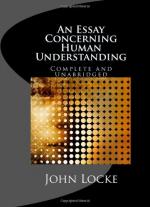
|
Understanding
This is the basic faculty of knowledge that like the eye, is needed for seeing but does not see itself, says Locke.
Simple Ideas
These things are derived directly from experience and cannot be broken down into constituent parts.
Complex Ideas
These things are, through a variety of different methods, made up of smaller components.
Secondary Qualities
These things are qualities like color or taste that are not things in themselves but, rather, arise from our reaction to those things.
Primary Qualities
These things reside in objects themselves and are invariant across different experiential modes.
Reflection
This is the faculty that takes ideas directly as objects rather than experience.
Substance
This quality is the presumed basis of all things.
Modes
This quality is a kind of variation.
Relations
These qualities are properties that hold between things but that are not, strictly speaking, in things.
Knowledge
This mode...
(read more Object Descriptions)
|
This section contains 164 words (approx. 1 page at 300 words per page) |

|




